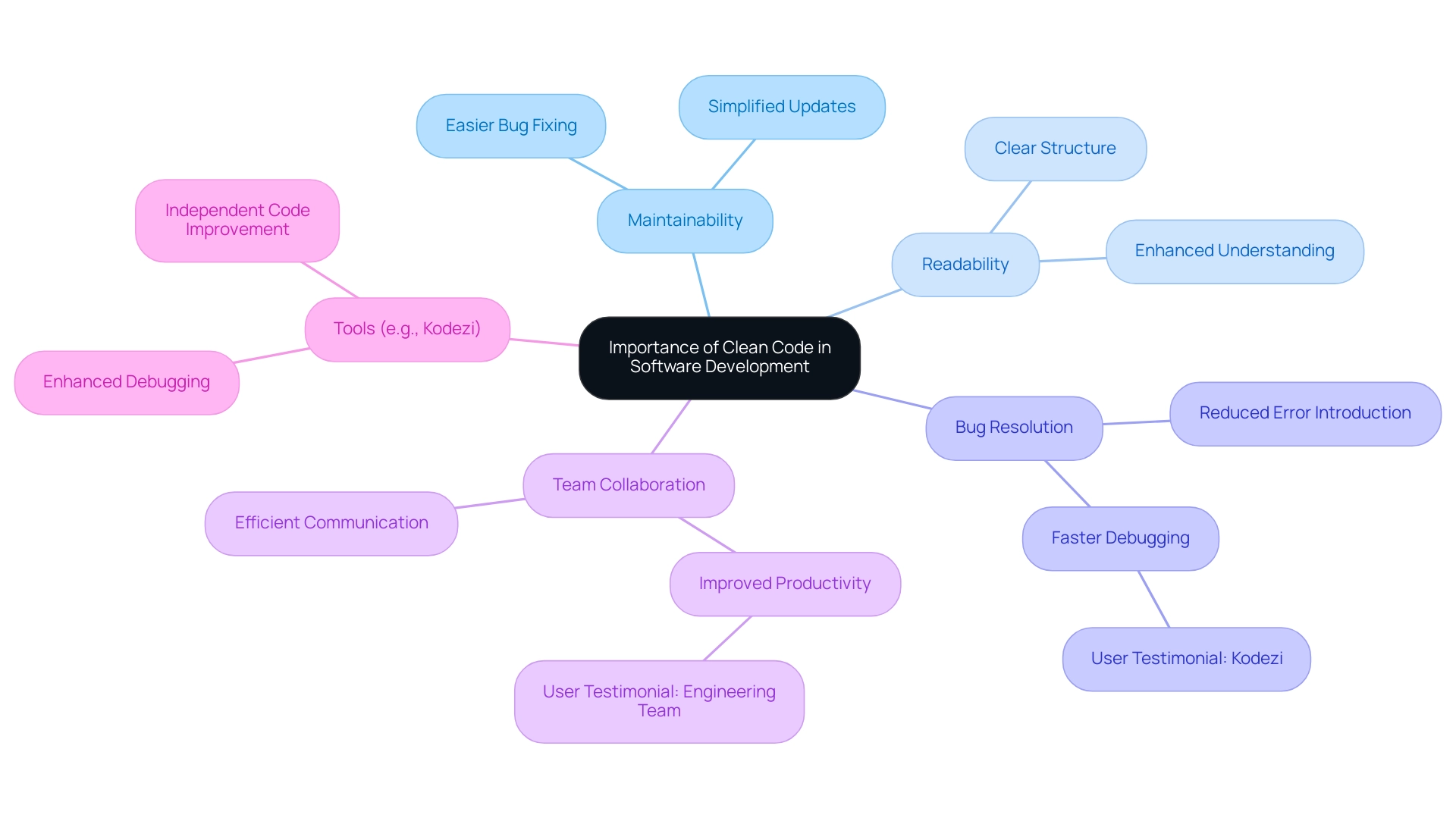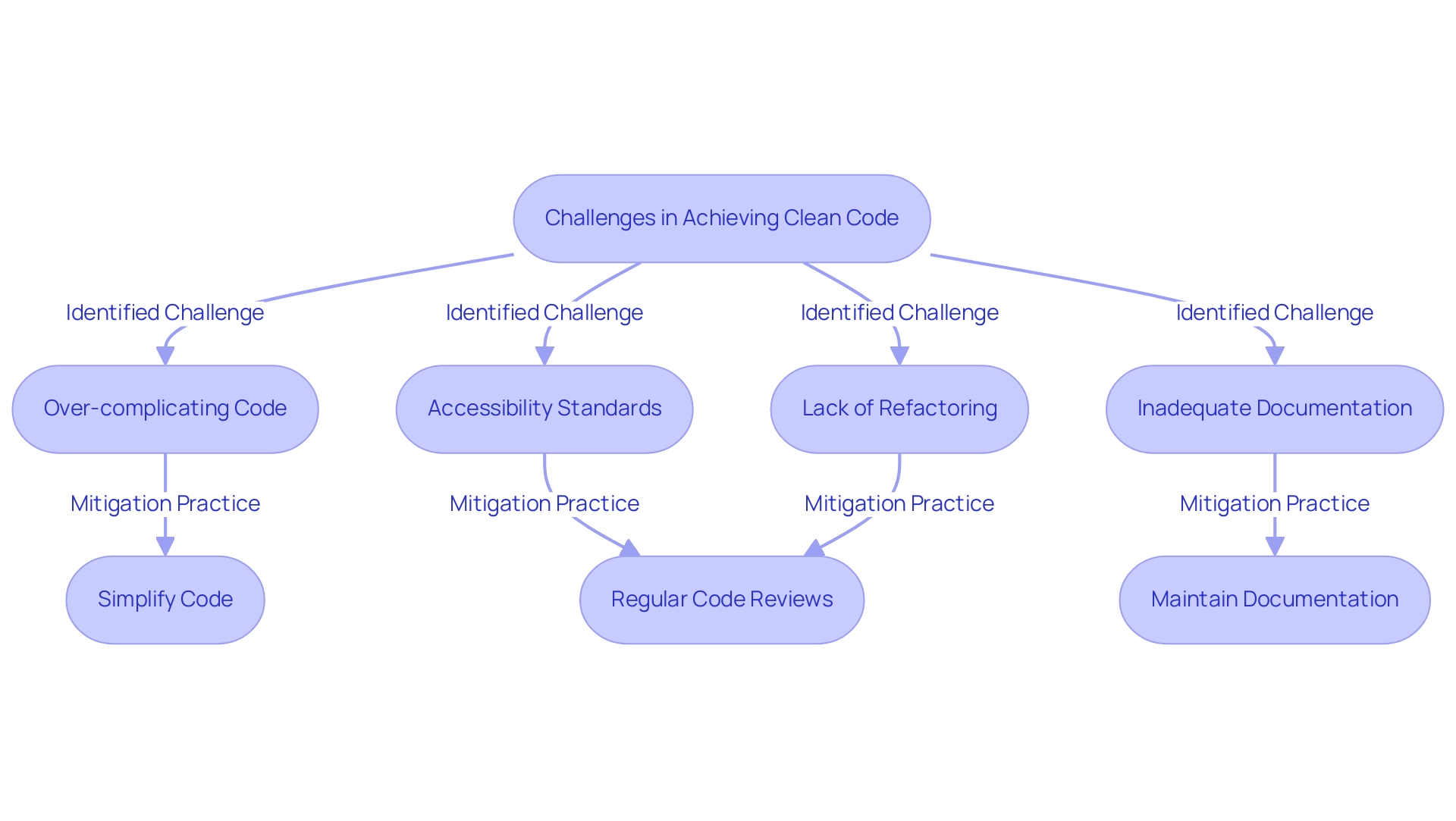Introduction
In the ever-evolving landscape of software development, the significance of clean code cannot be overstated. It serves as the backbone of efficient programming, enabling developers to create applications that are not only functional but also maintainable and scalable. By adhering to clean coding principles, teams can enhance collaboration, reduce bugs, and streamline the process of implementing new features.
With the integration of innovative tools like Kodezi, developers are empowered to uphold these standards effortlessly, transforming the coding experience into one that maximizes productivity and minimizes errors. As organizations strive for excellence in their software products, understanding and embracing the tenets of clean code becomes an essential strategy for achieving long-term success.
Defining Clean Code: What It Is and Why It Matters
Clean code is exemplified by principles of clarity, simplicity, and efficiency, making it accessible for developers to read, comprehend, and maintain. Clean code, which is essential for software development, directly influences the overall quality of the product. By avoiding issues such as Null Pointer Exceptions, which can arise from passing NULL to methods, developers can significantly enhance software reliability.
Clean code reduces the likelihood of bugs, fosters collaboration among team members, and simplifies future updates and modifications. Instruments such as CLI enhance B2B engineering teams' ability to independently improve code quality and address issues prior to deployment, emphasizing the significance of tidy coding practices. The CLI allows teams to instantly identify and fix codebase issues, enforce best practices and standards, and optimize performance—all in seconds.
Additionally, KodeziChat provides rapid solutions to coding questions, streamlining the debugging process. As noted in recent news, Java classes should start with public static variables, followed by private instance variables, and must adhere to the principle of having a single responsibility. Rafael Salerno aptly states,
They must have only one responsibility,
highlighting a fundamental principle of tidy coding.
This approach, backed by automated testing and debugging capabilities, ensures that each class is concise and promotes sustainable software development practices. The case study titled 'Conclusion' emphasizes that coding principles are habits that need to be developed over time, encouraging ongoing practice to enhance code quality. Adopting clean code and tidy coding principles, enhanced by Kodezi's tools, leads to superior quality products and greater productivity.
For those interested, Kodezi provides a 5-minute quickstart and demos to assist teams in getting started swiftly, making tidy coding an essential practice in modern software development.
Key Principles of Clean Code: Best Practices for Developers
Key principles of clean code what is programming include meaningful naming, which ensures that variables and functions are named to clearly convey their purpose. Additionally, organization of the program is vital; developers should structure their work logically, grouping related functions and classes together. Using the AI-driven programming tool, developers can automatically rectify programming errors and examine bugs, emphasizing the significance of these principles.
Additionally, with the CLI tool, teams can automatically repair codebases effectively, ensuring that proper coding practices are upheld throughout the development process. Other best practices include:
- Keeping functions small and focused
- Avoiding duplication
- Utilizing comments wisely to clarify complex logic
By adhering to these principles and utilizing Kodezi's features, including Kodezi CLI, developers can produce software that exemplifies clean code, what is not only tidy but also simpler to navigate and maintain, ultimately boosting productivity.
The Importance of Clean Code in Software Development
In software development, clean code is essential as it directly impacts the maintainability and readability of the codebase. When programming is tidy, it becomes simpler for developers to spot and resolve bugs, introduce new features, and work efficiently with team members. As many users have noted, tools like this significantly enhance this process, allowing over 1,000,000 programmers to debug more efficiently and unlock their coding superpowers.
For instance, one user mentioned, 'Kodezi has helped me find and fix bugs faster and easier than trying to manually.' Furthermore, organized code reduces the likelihood of introducing errors during updates, thereby enhancing the overall quality of the software. The CLI, created for enterprise developers, independently enhances codebases and resolves issues before they enter production, resulting in quicker cycles and increased project success in a fast-paced environment.
As another user stated, 'It has drastically improved our engineering team’s productivity and allowed us to focus on higher-level tasks.' By adopting tidy coding practices and exploring what clean code is, development teams can achieve maximum efficiency and productivity with Kodezi’s powerful tools.

Challenges in Achieving Clean Code: Common Pitfalls to Avoid
Achieving clean code what is necessary presents several challenges that developers must navigate to enhance efficiency and maintainability. A prevalent pitfall is the tendency to over-complicate programming, which can obscure its intended functionality and hinder productivity. As noted in industry discussions, 'Understanding and implementing ARIA (Accessible Rich Internet Applications) roles, keyboard navigation, and screen reader compatibility are just a few aspects that can pose significant challenges.'
This highlights the complexities that can arise, making simplicity essential. Furthermore, with 58 contributions regarding navigating design changes that risk accessibility standards, it is evident that balancing coding standards with accessibility needs is crucial. Inadequate documentation often leads to misunderstandings within teams about the code’s purpose and usage.
Additionally, a lack of regular refactoring further exacerbates the issue, allowing technical debt to accumulate and complicating future development. However, with the CLI tool—the Swiss Army Knife for programming teams—developers can auto-heal codebases in seconds, significantly reducing time wasted on pull requests. This tool not only simplifies the review process but also enhances quality by fixing bugs before they reach production.
A case study titled 'Navigating Design Changes Impacting Accessibility Standards' illustrates approaches to uphold accessibility while accommodating design changes. To mitigate these challenges, developers should focus on simplifying their scripts, maintain thorough documentation, and commit to regular reviews, all of which are made more efficient with the integration of Kodezi CLI. To get started quickly, the '5 minute quickstart' guide is available, along with opportunities to 'See a demo' for a hands-on experience.
These practices not only maintain coding principles but also encourage a collaborative atmosphere that improves overall productivity.

Long-Term Benefits of Clean Code: Investing in Quality Software
Sustaining tidy programming provides significant long-term benefits, especially in decreasing technical debt. By applying tidy coding principles, developers can significantly decrease the frequency of extensive rewrites and debugging sessions, leading to substantial time and resource savings. Furthermore, clean programming enhances team collaboration, as it is inherently more understandable and easier to modify.
This clarity cultivates a collaborative atmosphere that encourages innovation and creativity within development teams. Instruments such as CLI act as a Swiss-Army knife for developers, independently enhancing software quality and resolving issues before they reach production. Kodezi CLI features a quickstart guide and demo, allowing teams to experience its capabilities firsthand.
As a result, the investment in clean programming not only elevates software quality but also contributes to greater customer satisfaction and improved project outcomes. Notably, when considering the economic ramifications, the total estimated monthly impact of poor software quality—including customer churn—amounts to $42,666.67. The CLI assists in reducing these expenses by ensuring that quality is upheld throughout the creation process.
This highlights the importance of prioritizing clean code what is necessary to avoid financial losses and promote sustainable growth. By integrating automated tools like Kodezi CLI, teams can ensure quality is maintained throughout the development process, emphasizing the importance of investing in quality software development.
Conclusion
Clean code is not merely a technical requirement; it is a fundamental element that shapes the efficiency and effectiveness of software development. By embracing the principles of clarity, simplicity, and organization, developers can create code that is not only easy to understand but also maintainable and scalable. Tools like Kodezi play a pivotal role in this journey, empowering teams to enhance code quality and streamline the debugging process with remarkable speed and accuracy.
The challenges of achieving clean code are significant but surmountable. With a focus on avoiding common pitfalls such as over-complication and inadequate documentation, developers can foster a collaborative environment that encourages continuous improvement. Kodezi CLI stands out as a vital resource that simplifies the maintenance of clean code, allowing teams to focus on innovation rather than getting bogged down by technical debt.
Investing in clean coding practices yields substantial long-term benefits, including enhanced team collaboration and reduced technical debt. As organizations strive for excellence in their software products, the integration of tools like Kodezi not only safeguards code quality but also enhances customer satisfaction and project success. Ultimately, prioritizing clean code is not just about improving coding standards; it is about setting the foundation for sustainable growth and operational excellence in an increasingly competitive landscape.
Frequently Asked Questions
What is clean code and why is it important?
Clean code is characterized by principles of clarity, simplicity, and efficiency, making it easier for developers to read, understand, and maintain. It is essential for software development as it directly influences the overall quality of the product and enhances software reliability by reducing the likelihood of bugs.
How does clean code benefit software development?
Clean code reduces bugs, fosters collaboration among team members, and simplifies future updates and modifications. It helps developers spot and resolve issues more efficiently, enhancing overall productivity and project success.
What tools can help maintain clean code?
Tools like Kodezi's CLI enable teams to automatically identify and fix codebase issues, enforce best practices, and optimize performance. KodeziChat also provides rapid solutions to coding questions, streamlining the debugging process.
What are some key principles of clean code?
Key principles include meaningful naming of variables and functions, logical organization of the program, keeping functions small and focused, avoiding duplication, and using comments wisely to clarify complex logic.
What challenges do developers face in achieving clean code?
Developers often struggle with over-complicating code, inadequate documentation, and the accumulation of technical debt due to a lack of regular refactoring. Balancing coding standards with accessibility needs can also pose challenges.
How can Kodezi CLI assist developers in overcoming these challenges?
Kodezi CLI can automatically repair codebases, significantly reduce time spent on pull requests, and simplify the review process. This tool enhances code quality by fixing bugs before they reach production.
What long-term benefits does sustaining tidy programming provide?
Sustaining tidy programming decreases technical debt, reduces the frequency of rewrites and debugging sessions, enhances team collaboration, and leads to improved software quality and customer satisfaction.
How can teams quickly get started with Kodezi tools?
Kodezi offers a 5-minute quickstart guide and demos to help teams get started swiftly with their tools, making tidy coding an essential practice in modern software development.




